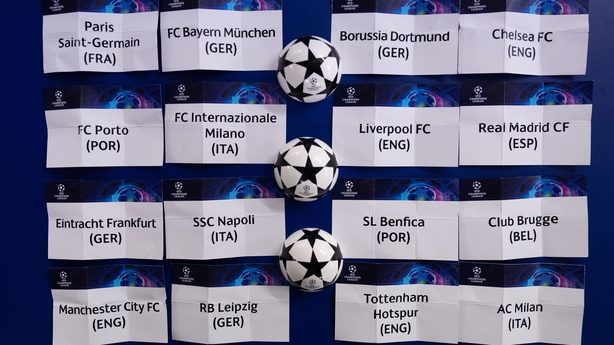In this week where love is in the air as Valentine's Day is marked, there would seem to be a lack of grá as the Champions League resumes. The round of 16 crept up on us without little fanfare.
Should we be surprised? Perhaps not, considering the lack of excitement generated by the pre-Christmas draw for this knockout round. PSG-Real Sociedad and Inter-Atletico are ties that may offer some intrigue but there are no juicy pairings.
Holders Manchester City and Real Madrid already have one foot in the quarter-finals but because of the open draw from here on in, the pair could meet in the last eight. Bayern Munich and Arsenal are also likely winners, though the defensive frailties shown by Germans far too often this term surely lessens their chances of ultimate success.
Elsewhere it's hard to make a case for PSG and Barcelona. Napoli, who looked good for much of last season's campaign, have regressed. Inter Milan, finalists last year and current Serie A leaders, could make another final if they avoid the bigger fish swirling around.
Having a Liverpool, Bayer Leverkusen or a Girona (still second in La Liga) involved at this stage of the competition would have added to the competitive edge.
We are where are we are, however. Friday, 15 March will see the draw for the both the quarters and the semi-finals. Hopefully, a more exciting path to follow on the road to Wembley and the final itself on 1 June.
And then the structure will change for next season. UEFA have opted for something different, a format that will see teams play more games once the competition proper begins.
All changed, changed utterly, thanks to the 'Swiss Model'.
A Super League in disguise?
'I think this is a Super League in disguise' - @RichieSadlier and @stephanieroche9 assess the expanded 36-team Champions League being mooted for 2024 onwards #rtesoccer pic.twitter.com/BavFW5JNpz
— RTÉ Soccer (@RTEsoccer) March 9, 2021
The Swiss Model is essentially one league, made up of 36 teams. So no more eight groups of four. The 36 will comprise the Champions League and Europa League winners, if not qualified based on their league positions, and sides automatically qualified from associations ranked 1-10 by UEFA. Seven teams from the play-off rounds will also gain entry.
It's also worth noting that the increase from 32 to 36 will see two countries receive an extra place - based on how their league performed in Europe this season. As things stand, Germany and Italy lead the way for those additional spots.
Based on seedings, a draw will see participants organised across four groups of nine. Each side will play two teams from their own group and two from each of the other three groups. That's eight matches in total, home and away.
At the conclusion of the league stage, we will have the standings from 1 to 36.
The top 8 sides will qualify for the round of 16 - those in positions 9-24 will play off to determine the other 8 sides.
For those placed 25-36, their European season will be at an end, no safety net of more games in the Europa League.
After that it's as is; knockout ties played over two legs, culminating in the 2024-25 Champions League final in Munich on 31 May.

In a change to the calendar, six of the eight league stage matches will be played from September to December, with the remaining two in January. The play-off round will take place in February.
By the way, the Swiss Model will also apply in the Europa League and Conference League.
Perhaps now was the time to try something new, with the current Champions League format in existence since 2003.
Indeed, in the years from 2000 to 2003, UEFA's flagship tournament saw four groups of four play home and away at the last-16 stage. There was little appetite to continue with that.
Two decades on and it's case of making it bigger again.
Much focus then on how this new format will work over the period from 2024-2027 - and maybe the time is right to try something new.
The question remains, however, as to whether we'll get more meaningful games in the now extended league stage?
My colleague Raf Diallo was less than enthused about that prospect, when writing in 2021: "But given a seeding system would still be in place, one would still expect the same sides that routinely reach the knockout stages to progress - either automatically among the top eight sides in the 'league' or among the next 16 sides that would duke it out in a play-off round for the prize of meeting that aforementioned top eight.
"And more games just means more margin for error for a big club that, like Manchester United or Barcelona this season, makes an underwhelming start or stumbles along the way.
"It also favours the clubs with deeper squads who can rotate in an already groaning schedule, under the weight of more - but not necessarily truly meaningful - matches. So to say it in another way, the exact same elite clubs are at an advantage."


